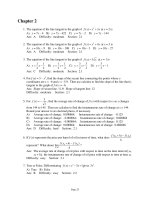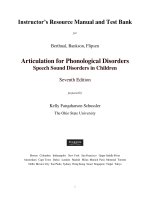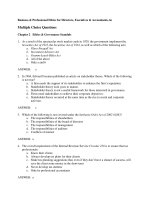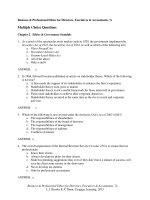Business and professional ethics 7th edition brooks test bank
Bạn đang xem bản rút gọn của tài liệu. Xem và tải ngay bản đầy đủ của tài liệu tại đây (132.65 KB, 5 trang )
Business & Professional Ethics for Directors, Executives & Accountants, 7e
Multiple Choice Questions
Chapter 2 Ethics & Governance Scandals
1. As a result of the spectacular stock market crash in 1929, the government implement the
Securities Act of 1933, the Securities Act of 1934, as well as which of the following acts:
a. Glass-Steagall Act
b. Investment Advisers Act
c. Gramm-Leach-Bliley Act
d. All of the above
e. Only a and b
ANSWER:
e
2. In 1984, Edward Freemen published an article on stakeholder theory. Which of the following
is not true?
a. A firm needs the support of its stakeholders to enhance the firm’s reputation.
b. Stakeholder theory took years to mature.
c. Stakeholder theory is not a useful framework for those interested in governance.
d. Firms need stakeholders to achieve their corporate objectives.
e. Stakeholder theory occurred at the same time as the rise in social and corporate
activism.
ANSWER:
c
3. Which of the following is not covered under the Sarbanes-Oxley Act of 2002 (SOX)?
a. The responsibilities of shareholders
b. The responsibilities of the board of directors
c. The responsibilities of management
d. The responsibilities of auditors
e. Conflicts of interest
ANSWER: a
4. The overall requirement of the Internal Revenue Service Circular 230 is to ensure that tax
professionals:
a. Know their clients
b. Always develop tax plans for their clients
c. Make tax planning suggestions that, even if they don’t have a chance of success, will
save the client some money in the short-term
d. Never develop tax shelters
e. Only be professional accountants
ANSWER: a
Business & Professional Ethics for Directors, Executives & Accountants, 7e,
L.J. Brooks & P. Dunn, Cengage Learning, 2015
5. A collateralized debt obligation (CDO):
a. Is an insurance policy that any investor can purchase
b. Is a bond that is secured by a portfolio of mortgages
c. Protects an investor in the event that the issuer of the mortgage defaults on the
contract
d. Acts as a hedge against changes in interest rates
e. Were outlawed with the passage of the Dodd-Frank Wall Street Reform and
Consumer Protection Act.
ANSWER: b
6. Which of the following is not a sign of an ethical collapse within an organization, according
to Marianne Jennings?
a. Pressure to meet financial goals
b. Hubris
c. Nepotism, favoritism and hiring sycophants
d. An open and candid organizational culture
e. Weak boards of directors
ANSWER: d
7. The U.S. Federal Sentencing Guidelines were introduced in 1991 to:
a. Help judges formulate sentences.
b. Avoid sentences that are too light.
c. Signal potential sentences to executives and directors.
d. Encourage executives and directors to avoid environmental damage.
e. All of the above.
ANSWER: e
8. Due diligence programs developed to reduce penalties levied under the U.S. Federal
Sentencing Guidelines for environmental harm did not include:
a. Awareness programs for employees.
b. Guidelines for employees.
c. Compliance oversight by corporate officials.
d. Rewards for non-compliance.
e. Encouragement for whistleblowers.
ANSWER: d
9. Which of the following financial crises or fiascos were not related to the Subprime Lending
Crisis?
a. Bear Stearns
b. Lehman Brothers
c. Bernie Madoff
Business & Professional Ethics for Directors, Executives & Accountants, 7e,
L.J. Brooks & P. Dunn, Cengage Learning, 2015
d. AIG
e. Galleon Group
ANSWER: c and e
10. Which was the largest fraud or bankruptcy leading to the crisis of investor confidence in
2002?
a. Enron
b. Global Crossing
c. WorldCom
d. HIH Insurance
e. Xerox
ANSWER: c
11. The crisis in investor confidence in 2002 was caused by:
a. Lack of integrity of business leaders.
b. Manipulation of financial results.
c. Boards of Directors that did not provide proper oversight.
d. Findings of alert auditors
e. All of the above.
ANSWER: a, b, and c.
12. SOX contained sections with regard to the audit and/or audit committee that were designed
to:
a. Increase the independence of management.
b. Increase the financial literacy of audit committee members.
c. Limit the conflicts of interest related to the services an auditor can perform.
d. Restrict the ability of auditors to serve on the audit committee.
e. All of the above.
ANSWER: b and c
13. The U.S. Internal Revenue Service (IRS) implemented Circular 230 to remedy problems
found with regard to the marketing of tax shelters thought to:
a. Have no other purpose except to reduce taxes.
b. Have lower than 50% chance of success if challenged by the IRS.
c. Not be in accordance with client’s needs.
d. Create fictitious losses.
e. All of the above
ANSWER: e
14. Why didn’t investors caught in the Subprime Lending Crisis take earlier note of the risks
inherent in investments known as collateralized debt as obligations (CDOs)?
Business & Professional Ethics for Directors, Executives & Accountants, 7e,
L.J. Brooks & P. Dunn, Cengage Learning, 2015
a.
b.
c.
d.
e.
Greed and the desire for high returns.
Banks were selling and buying them.
Risks were buried in complex, jargon-oriented documents.
Risks were diversified over many mortgages.
Only three of the above.
ANSWER: a, b, c, and d
15. The U.S. Government created the Troubled Asset Relief Program (TARP) to:
a. Bail out investors in U.S. financial firms and institutions.
b. Avoid a worldwide financial crisis.
c. Stimulate the U.S. economy
d. Resolve the financial crisis in Iceland.
e. Make a profit on the ultimate sale assets bought at a low value.
ANSWER: a, b, and c
16. The Dodd-Frank Wall Street Reform and Consumer Protection Act was created after the
Subprime Lending fiasco to protect consumers from deceptive practices related to:
a. Mortgages
b. Credit cards
c. Cars
d. Financial derivatives
e. All of the above
ANSWER: a, b, and d
17. A Ponzi scheme, such as Bernie Madoff ran, is:
a. A card game
b. A sound investment scheme
c. A scheme to improve the environment
d. Hard to hide forever
e. None of the above.
ANSWER: d
18. Ralph Nadar contributed to the lack of credibility of corporations by exposing their:
a. Excessive bonus schemes
b. Greed
c. Poor car safety
d. Poor environmental record
e. “Seller beware” attitude of toy manufacturers.
ANSWER: c and d Note Ch. 2 discusses only c
19. Freddie Mac and Fannie Mae:
Business & Professional Ethics for Directors, Executives & Accountants, 7e,
L.J. Brooks & P. Dunn, Cengage Learning, 2015
a.
b.
c.
d.
e.
Were created to support the U.S. housing market.
Stimulated the U.S. Housing Bubble.
Provided bailout funds to the U.S. Government
Acted in the best interest of consumers
Acted in the best interest of lenders
ANSWER: a and b
20. Which of the following demonstrated extraordinary hubris?
a. Kenneth Lay
b. Bernie Ebbers
c. Arthur Andersen
d. Scott Sullivan
e. All of the above.
ANSWER: a and b
Business & Professional Ethics for Directors, Executives & Accountants, 7e,
L.J. Brooks & P. Dunn, Cengage Learning, 2015









